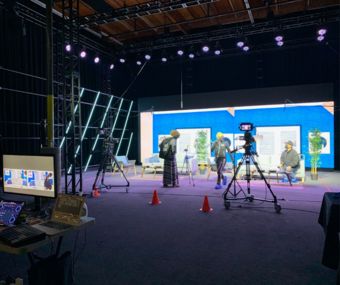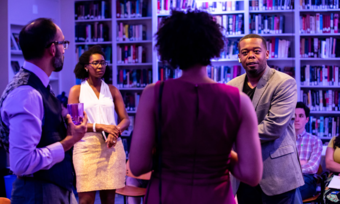Interview with Suzanne Appel
Suzanne Appel is the managing director of Cutting Ball Theater, where playwright Andrew Saito is spending his Mellon residency. Cutting Ball is a fifteen-year-old company in San Francisco founded by artistic director Rob Melrose and associate artistic director Paige Rogers. Appel joined the company in 2011, after completing her MBA/MFA in theater management from Yale School of Drama. This interview was conducted right before the September 2014 gathering of Mellon Residency Playwrights and Theaters in Boston, hosted by HowlRound and ArtsEmerson.
Laura Brueckner: Let’s just jump right in. As managing director, how are your interactions with Andrew different from those you have with nonresident playwrights?
Suzanne Appel: Usually, as a playwright, your major negotiation with a theater company is, “Okay, you want to produce my play. Are you giving me an advance, and if so, how much? What are the royalties?” Then you go through the process of producing one play with that theater. Then maybe you’re lucky and you get to come back.
Having Andrew embedded within the organization is really different from that. It’s not just one transaction; it’s actually many exchanges. I’m thinking of things beyond the contractual negotiation, like: “How much time am I going to be spending writing in the community, versus writing in the office?” Or, “How much time should I be spending engaging with our community, what’s a fair amount?” “The organization wants me to be a resident playwright, so I should be part of the process of learning and understanding the audience.” It’s the process of becoming a part of the organization.
Laura: Sounds like a big change—and Cutting Ball is a fairly small organization, staff-wise.
Suzanne: The organization as a whole is growing, but we were three people and we went to four. Adding one staff person increased our staff by 25 percent. That’s significant.
What’s also been interesting is Andrew’s desire to advocate on behalf of other playwrights. Andrew has so much generosity built into him. And it’s been really rewarding! He’s brought to the organization a number of other [playwrights]—Basil [Kreimendahl], whose play [Sidewinders] we actually ended up producing after it was in our RISK IS THIS [Festival of New Experimental Plays]. Then Kat Sherman, who’s someone we had in RISK IS THIS last year—Rob [Melrose] liked her work so much that we’ve actually commissioned her to do a new piece for this coming year’s RISK IS THIS. Both Basil and Kat are playwrights we never would have met if Andrew hadn’t made that introduction.
Laura: How has this residency stretched you as a managing director?
Suzanne: I would say the bigger stretches are when, out of the same generosity, Andrew asks for things we haven’t budgeted or planned for. Numbers really do tell a story; they tell a story of where the organization is putting its priorities, and it’s something that we think about really carefully. We start with a draft that our board sees in March, that gets passed in June, for a fiscal year that starts August 1. So when that budget is being created and then passed, we’re trying to think about all of the things that we want to do next season, and what our priorities are going to be—and because we’re a small organization, we’re often stretching those dollars pretty thin.
Sometimes that means that when a new idea comes up, we have to ask, “Does this mean that we’re not going to do something that we’ve already committed to? Or does it mean that there’s another source of support?” “How do we accommodate this generosity?” and “Where do we actually have to draw the line, because this might be—instead of adding to what we're doing—pulling away from what we’re committed to doing well.” It's tricky.
But Andrew is a writer with a million incredibly creative ideas. Where stuff comes from in his brain is amazing. In fact, he recently attended an Audience Development Committee meeting, and he came up with tons of ideas for speakers, groups and events! It was exciting getting to see Andrew working alongside some of our board members, who come from a very different perspective.
And then there are the ideas that we’ve had around Andrew’s productions. We’re doing a reading of Andrew’s play, Mount Misery, in partnership with Lorraine Hansberry Theater (LHT) and the Museum of the African Diaspora (MoAD), which will help us reach out beyond our audience to some other, newer audiences.
Laura: How did Andrew help with those partnerships?
Suzanne: Andrew came with me to the meeting with the Museum of the African Diaspora. It was exciting for them to be able to hear from Andrew. I think whenever you can have an artist’s voice in the room you really get a different perspective on the work.
With LHT, we first wanted to approach them because they do a Passport Series, where they invite their audience to go see work at other theaters around town. So initially that conversation started from a marketing perspective. But then we thought, “Hey, we have an Asian American playwright who’s writing a play about one of the greatest African American historical figures in our country’s history, and we don't have a creative voice who’s representative of that community on our staff. We probably should be talking to other people in our field who have expertise in that area.”
So it was out of having this conversation with LHT, specifically with [artistic director] Steven Anthony Jones, and it turned out that they already had a partnership to do a reading series. So we were able to ask, “Hey, how about having one of the pieces in your reading series be Mount Misery?” And Steven said that he really wanted to be actively involved in the work. So he’s helped us with casting, and has sat in in some [readings], and we’ve had feedback sessions that have included Rob, Steven, Deborah, and myself.
So there’s this incredible outcome: doing this reading with MoAD and LHT, leading into a full production where we have the input of these other two organizations behind this work.
Initially, we thought, “Great! Andrew’s a playwright we believe in! Awesome, he’s going to get a full-time salary! We're gonna get all these great plays from him—this is gonna be awesome!” But it’s not transactional, it’s relational. It’s about working with somebody.
Laura: It must be wonderful to see relationships that were initially conceived as marketing-based turn into something more creative.
Suzanne: Much more creative, much deeper. And all of that stems out of Andrew’s creativity and really wanting to work with other people.
Laura: What have you discovered so far that you’d like to impart to other managing directors considering applying for this residency?
Suzanne: Every company is different, but I would say that this process involved a really big commitment to this playwright and to his ideas. I think it’s a bigger commitment than we maybe even initially anticipated. You can’t think of this as just another grant you’re writing for a source of support. And you should expect that—in the same way that [you would if you were] adding another full-time director level position to your theater company—that will play into the decision-making and resource allocation process.
Initially, we thought, “Great! Andrew’s a playwright we believe in! Awesome, he’s going to get a full-time salary! We're gonna get all these great plays from him—this is gonna be awesome!” But it’s not transactional, it’s relational. It’s about working with somebody. A lot. I understand that with the residencies, some playwrights are more “resident” than others—but Andrew is a very active and full part of our company.
One of the ways in which I’ve grown through the process has been learning to keep an open mind, to always listen to the idea, because it’s often a really good one, and trying to create an understanding and expectation that, even if we can’t make this thing happen, it isn’t because we don’t appreciate it, because often it does turn into something we go for. I really appreciate that, with Andrew, when he offers an idea, it always comes with an offer of how he will be involved in it. He’s not someone who’d ever think, “Oh, I'm going to tell you what to do, and, Presto-Change-o!, you're going to do it.” He thinks very actively about how he can help make something happen.
Laura: “Active” is a good way to describe Andrew in general.
Suzanne: This is a big season for Andrew. We’re doing a world premiere of his Mount Misery and he’s writing two completely new plays for RISK IS THIS, one of which is an adaptation of Moby Dick—Hello, that's going to be enormous! He’s also recently done a translation of Life is a Dream, which we’re going to workshop. That’s four new plays in one year. And he’s taken on other things on top of that.
Laura: Structuring a season’s budget is something most playwrights don’t have much contact with. How have you found yourself bringing your knowledge to conversations with Andrew?
Suzanne: We’ve had that conversation most directly around casting issues for Mount Misery. We’re a non-Equity theater and proud of it; we think that means that we often get to give a play a longer process and stronger development period. But with Mount Misery, we realized very quickly that the casting was a really important element in whether or not this play was going to succeed.
In our normal budgets, we often don’t budget for Equity actors. We often put our limited resources heavily into the design of our work. That's something that we really prioritize at Cutting Ball—that we think our work really looks good on stage. That’s important to us.
But with Andrew’s play what it all looks like actually is not the core of this piece. His play is really about the relationship between Rumsfeld and Douglass, and the relationship between Douglass and his overseer, Edward Covey, and Rumsfeld’s relationship with his wife, Joyce. So in conversation with Andrew we realized that casting was a part of the play where we really needed to put some resources.
The actress we’re hiring for the role of Joyce, Lorri Holt, is amazing, and we realized that having her in that role made a bigger difference to how the rest of the play played on stage [than other casting choices]. The play was dramatically improved by having this particular actress in that role. And this actress is someone who has been a mainstay of the Bay Area acting community for a long time, who is a professional and an expert in her field…and who is a member of Actors’s Equity.
So once we decided, with Andrew, that that was the priority, Rob and I went back to the budget to figure out how we could make that work. Having Andrew in residence—just given the number of times that we tried out that play with different actors—was important.
Laura: Any other logistical advice for your fellow managing directors?
Suzanne: These are just stupid little things…but our printing budget is way higher because Andrew’s here. We’re using a lot more ink and paper. And that’s because he’s writing plays! You write plays, you gotta print them out somewhere.
Also, anybody who works here can hold meetings in the office. So if any meeting’s scheduled in the office, we need to make sure it’s not conflicting with, say, other meetings in the office. So we’ve had to establish [with Andrew], “Hey, you should be part of the office calendar.” It was just one of those things: “Oh, this hasn't come up before. Of course—our resident playwright!” Also: “These are things you’ll want to be able to access, so that instead of it feeling like asking for permission, you’re a part of the team that knows what’s happening.” It’s part of really actively choosing to and wanting to be a part of an organization, and an appreciation for what it is that happens here.
The biggest change is just—and this is the whole point of the residency—the idea of the artist being on the outside versus the artist being on the inside. It’s just a very different thing. When you welcome someone in as a resident, it’s very hard to then suddenly say, “Oh, but this part of the organization is not for you.” Once you open that door, it’s open. And Andrew has asked to be a part of things that we might not have even imagined he’d care about, like that Audience Development Committee meeting—but actually that was the best thing in the world to have him at!
Ultimately, it goes beyond inviting this person to your staff meetings. This is a much deeper investment and embeddedness. So it’s intensely rewarding—and also means that we’ve had to adjust expectations all over the place.
Laura: And have different conversations than you’ve ever had before.
Suzanne: Yeah, exactly! On Andrew’s side, I think he’s done a really good job with us, but I know it’s been hard. Sometimes he’s had to assert himself and say, “Hey! I would like to be a part of this!” And whenever that’s happened I’ve been, like, “Argh! Sorry! Sure, come on!”
Part of that is learning how to work with someone in a role that is new for all of us. Theater, as an art form, is one in which so much of what we call “professionalism” is exactly about expectation—having expectations about what everybody’s role is, because this field takes so many different human beings in order to put something together. In the theater community, everybody has a dedicated role where they’re an expert. Where they bring something to the table, and everybody knows what they’re going to bring, and when it’s due, and how it fits into everything else—and you know you have to respect that person's expertise. Learning all of that is part of why we get to call ourselves professionals.
So this residency thing totally upends all of that. It’s completely different.
Laura: You're basically back to freestyling.
Suzanne: Yeah, exactly! We’re a small, nimble organization; I think we manage change pretty well. But in a larger company, I’m very curious to learn how that’s gone—for not just managing leaders, but production managers, and development directors, and marketing directors, and other people who are navigating having somebody else who’s not following the path that you’ve learned to expect them to follow. That’s part of the challenge and the beauty of having the grant.












Comments
The article is just the start of the conversation—we want to know what you think about this subject, too! HowlRound is a space for knowledge-sharing, and we welcome spirited, thoughtful, and on-topic dialogue. Find our full comments policy here
Suzanne, thank you for sharing so much so openly.